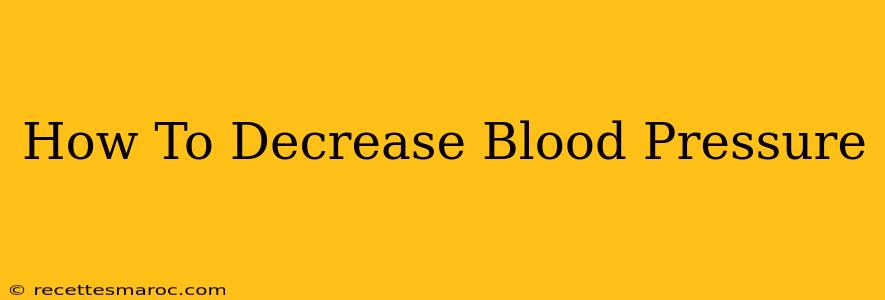High blood pressure, or hypertension, is a serious health concern affecting millions worldwide. Fortunately, there are many ways to decrease blood pressure naturally, improving your overall health and well-being. This comprehensive guide explores effective strategies to lower your blood pressure without relying solely on medication. Remember, always consult your doctor before making significant changes to your diet or lifestyle, especially if you have pre-existing conditions.
Lifestyle Changes to Lower Blood Pressure
1. Dietary Adjustments: The Cornerstone of Blood Pressure Control
Your diet plays a crucial role in managing blood pressure. Focus on incorporating these changes:
- Reduce Sodium Intake: Sodium is a major contributor to high blood pressure. Limit processed foods, fast food, and restaurant meals, which are often high in sodium. Read food labels carefully and choose low-sodium options.
- Increase Potassium Intake: Potassium helps balance sodium levels in your body. Good sources include bananas, spinach, sweet potatoes, and beans.
- Embrace the DASH Diet: The Dietary Approaches to Stop Hypertension (DASH) diet emphasizes fruits, vegetables, whole grains, and lean protein. This diet is highly effective in lowering blood pressure.
- Limit Saturated and Trans Fats: These unhealthy fats raise cholesterol levels, contributing to high blood pressure. Choose lean meats, poultry without skin, and fish.
- Increase Fiber Intake: Fiber helps lower cholesterol and blood pressure. Include plenty of fruits, vegetables, and whole grains in your diet.
2. Exercise Regularly: A Powerful Tool for Lowering Blood Pressure
Regular physical activity is vital for overall health and significantly impacts blood pressure. Aim for at least 150 minutes of moderate-intensity aerobic exercise or 75 minutes of vigorous-intensity aerobic exercise per week. This could include brisk walking, jogging, swimming, or cycling. Even short bursts of activity throughout the day can make a difference.
3. Weight Management: A Significant Factor in Blood Pressure
Being overweight or obese significantly increases your risk of high blood pressure. Losing even a small amount of weight can have a noticeable impact on your blood pressure. Combine a healthy diet with regular exercise to achieve and maintain a healthy weight.
4. Stress Reduction Techniques: Managing Stress for Better Blood Pressure
Chronic stress contributes to high blood pressure. Practice stress-reducing techniques such as:
- Yoga: Improves flexibility, reduces stress, and lowers blood pressure.
- Meditation: Promotes relaxation and reduces stress hormones.
- Deep Breathing Exercises: Helps calm the nervous system and lower blood pressure.
- Spending Time in Nature: Being outdoors has a calming effect and can reduce stress.
5. Limit Alcohol Consumption:
Excessive alcohol consumption raises blood pressure. If you drink alcohol, do so in moderation. For men, this means up to two drinks per day, and for women, it's up to one drink per day.
6. Quit Smoking:
Smoking significantly increases your risk of high blood pressure and other health problems. Quitting smoking is one of the best things you can do for your health.
Natural Supplements for Blood Pressure (Consult Your Doctor First)
While lifestyle changes are the most effective ways to lower blood pressure, some natural supplements may also offer benefits. However, it's crucial to consult your doctor before taking any supplements, as they can interact with medications or have side effects. Some commonly discussed supplements include:
- Magnesium: Plays a role in blood vessel relaxation.
- CoQ10: An antioxidant that may help improve heart health.
- Garlic: May help lower blood pressure and cholesterol.
Monitoring Your Blood Pressure
Regularly monitoring your blood pressure is essential. Use a home blood pressure monitor to track your readings and share them with your doctor. This allows for early detection of any issues and helps you and your doctor monitor the effectiveness of your lifestyle changes.
Conclusion: A Holistic Approach to Lowering Blood Pressure
Lowering blood pressure naturally involves a holistic approach encompassing dietary changes, regular exercise, stress management, and potentially, certain supplements under medical supervision. By adopting these strategies, you can significantly improve your cardiovascular health and overall well-being. Remember, consistency is key. Small, sustainable changes made over time will yield significant results in lowering your blood pressure and improving your quality of life. Always consult your doctor for personalized advice and to rule out any underlying medical conditions.

